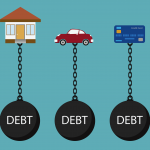We’re all guilty of impulse spending at times. We make a quick run into the store to buy a gallon of milk and come out with a cart full of goodies we weren’t expecting to buy, and probably shouldn’t have bought, but we saw it and tossed it in without a second thought.
Impulse spending can be fun at times, but it often leads to buyer’s remorse later on. This is especially true if your budget isn’t quite in great shape. The best way to decide if you have a problem with impulse spending can be to add up how much money you spend on frivolous things you really could go without.
The truth is, you were set up to fail before you even set foot in the store. There’s a concept called “The Power of Perimeter” that the vast majority of stores follow, which was designed to get you to impulse buy.
For example, there’s a very good reason why they put milk at the very back of the store. They know most people buy gallons of milk on a regular basis, so if you’re making that quick stop, you’ll have to trek through multiple aisles to get to what you really came for.
If you’re really hungry, they hope your eyes will spot the Little Debbie’s snack cakes on your way to the back. In fact, they put all the essential items people buy regularly (bread, dairy, meats), on the outside perimeter of the store, forcing you to walk by/through most of the store just to get the essentials. It’s not just supermarkets, but retail who does this also.
If you’re on a tight budget and you’re trying to save money, this can be dangerous ground for you to walk on. There are seven ways you can combat this and it involves you being fully prepared and ready for war before you walk in.
1) Write a list. The goal of most stores is to get you to spend as much money as possible and they hope you show up unprepared. But, if you write a list and are determined to stick ONLY to that list, you’ll have a lot more success.
2) Put a limit on the number of visits to the store you make. Plan your shopping trips around your pay schedule and buy everything you need for the week at one time. If you’re proactive and plan ahead, you’ll have much more success preventing impulse buying than the person who runs into the store every other day.
Calculate how much milk your family drinks in a week. Buy two gallons if you need to to stop yourself from going mid-week.
3) Use store apps. One of the latest tech trends that are super convenient for shoppers are store apps where you can shop online. Kroger, Meijer, Walmart, and most other major stores have this option. They will do the shopping for you and you just pick it up curbside. It completely takes impulse buying out of the equation.
4) Don’t shop while hungry. This is a big one. Most people who make a quick trip to the store do so right after work or midday on the weekend. If you’re hungry, your stomach might make all the buying decisions for you, and you’ll overspend based on what you’re feeling at that moment. Instead, eat before you shop.
5) Avoid window shopping, especially when you’re bored. A lot of people get bored and decide they’re going to go window shopping or even worse, hit the mall. But these stores are designed to peak your attention and get you to want to walk in and buy something. It’s like going to the grocery store hungry. If you’re on a tight budget, find something else to do!
6) Rationalize your spending. Before making a purchase, there are a series of questions you can ask yourself. Do you really need that item? Can you afford it? Can you wait to buy it? Do you have other bills or debts that are more important? Will this item go on sale (there are a lot of apps out there that will let you see the history of prices for various items)?
7) Set a budget. You should know what you can afford to spend each month. Set aside a portion for food and other necessities. If you know you will need new clothes that month, decide what you’re willing to spend ahead of time and stick to that budget.
Overspending is easy when they design stores to trigger you into impulse buying mode. By taking your time and planning ahead of time, you can save more money and keep your budget intact.




